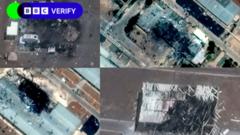In retaliation for Israeli airstrikes that severely damaged Iraq's nuclear capabilities, Iranian missiles targeted at least seven locations in Tel Aviv, resulting in multiple injuries. As the situation escalates, political leaders on both sides make grave claims regarding militaristic responses and international implications.
Escalating Conflict: Iranian Missiles Strike Tel Aviv in Response to Israeli Attacks

Escalating Conflict: Iranian Missiles Strike Tel Aviv in Response to Israeli Attacks
Iranian missiles hit multiple sites in Tel Aviv, causing injuries and heightened tensions following Israel's recent strikes on Iranian nuclear facilities.
June 13, 2025, 11:23 p.m. ET
**Live Updates: Iranian Retaliation Following Israeli Airstrikes**
**Tel Aviv and Tehran -** The burgeoning conflict between Israel and Iran intensified as Iranian missiles struck Tel Aviv and surrounding areas late Friday, resulting in injuries to at least 22 individuals according to local emergency services. The Israeli military reported multiple site hits, causing damage to apartments and vehicles, and images of flames engulfing structures quickly spread across media outlets.
The exchange escalated dramatically after Israel's military conducted substantial airstrikes on Iranian facilities, with specific targets including the Natanz nuclear site, as acknowledged by Rafael Grossi, head of the International Atomic Energy Agency (IAEA). Grossi stated that these strikes not only compromised the above-ground enrichment plant but also raised concerns about radiological contamination, despite the underground facilities remaining intact.
Israeli defense authorities confirmed that their Iron Dome defense system intercepted numerous incoming missiles, with explosions noted across Israeli airspace. Rescue operations on the ground focused on aiding individuals trapped in damaged structures. Emergency reports indicated injuries varied from light to severe, with some victims transported to hospitals, one of whom is reported to be in critical condition.
Israeli Prime Minister Benjamin Netanyahu reacted strongly, framing Iran's missile strikes as a "crossing of red lines" and suggesting that such aggressive moves would result in severe consequences for Iran's governing regime. He further encouraged Iranian citizens to revolt against their leadership, claiming they are vulnerable.
The conflict's complexities are compounded by US military involvement, with American forces reportedly assisting Israel in intercepting missiles, indicating a possible escalation in their involvement in the regional conflict. Meanwhile, Iranian officials vowed to respond with increased intensity following their losses, emphasizing a determined stance against any acts they categorize as aggression.
**Regional Reactions and Implications**
Responses from the Middle East and globally vary, with some countries expressing concerns over Israel's military actions, labeling them as violations of international law. Iranian authorities warned of further retaliation, suggesting potential military strikes targeting Israeli interests across the region.
As the conflict develops, both nations prepare for an extended campaign that could reshape regional alliances and influence international relations. With Western nations generally supporting Israel's defensive posture, dissent concerning military actions raises questions about the long-term ramifications for security and diplomacy in the region.
The situation remains fluid, with defense agencies on high alert and calls for de-escalation amidst fears of an extended military confrontation.
**Live Updates: Iranian Retaliation Following Israeli Airstrikes**
**Tel Aviv and Tehran -** The burgeoning conflict between Israel and Iran intensified as Iranian missiles struck Tel Aviv and surrounding areas late Friday, resulting in injuries to at least 22 individuals according to local emergency services. The Israeli military reported multiple site hits, causing damage to apartments and vehicles, and images of flames engulfing structures quickly spread across media outlets.
The exchange escalated dramatically after Israel's military conducted substantial airstrikes on Iranian facilities, with specific targets including the Natanz nuclear site, as acknowledged by Rafael Grossi, head of the International Atomic Energy Agency (IAEA). Grossi stated that these strikes not only compromised the above-ground enrichment plant but also raised concerns about radiological contamination, despite the underground facilities remaining intact.
Israeli defense authorities confirmed that their Iron Dome defense system intercepted numerous incoming missiles, with explosions noted across Israeli airspace. Rescue operations on the ground focused on aiding individuals trapped in damaged structures. Emergency reports indicated injuries varied from light to severe, with some victims transported to hospitals, one of whom is reported to be in critical condition.
Israeli Prime Minister Benjamin Netanyahu reacted strongly, framing Iran's missile strikes as a "crossing of red lines" and suggesting that such aggressive moves would result in severe consequences for Iran's governing regime. He further encouraged Iranian citizens to revolt against their leadership, claiming they are vulnerable.
The conflict's complexities are compounded by US military involvement, with American forces reportedly assisting Israel in intercepting missiles, indicating a possible escalation in their involvement in the regional conflict. Meanwhile, Iranian officials vowed to respond with increased intensity following their losses, emphasizing a determined stance against any acts they categorize as aggression.
**Regional Reactions and Implications**
Responses from the Middle East and globally vary, with some countries expressing concerns over Israel's military actions, labeling them as violations of international law. Iranian authorities warned of further retaliation, suggesting potential military strikes targeting Israeli interests across the region.
As the conflict develops, both nations prepare for an extended campaign that could reshape regional alliances and influence international relations. With Western nations generally supporting Israel's defensive posture, dissent concerning military actions raises questions about the long-term ramifications for security and diplomacy in the region.
The situation remains fluid, with defense agencies on high alert and calls for de-escalation amidst fears of an extended military confrontation.




















